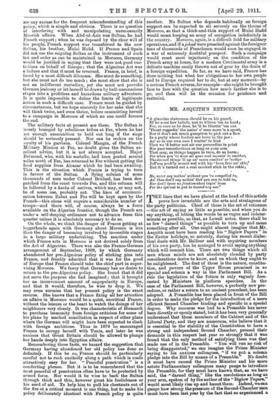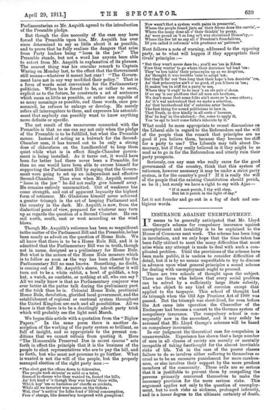MR. ASQUITH'S RETICENCE.
"A ginooine statesman should be on his guard, Ef he must hey beliefs, nut to b'lieye 'em to hard ; For, ez sure ez ho does, he'll be blurtin"em out 'Thont regardin' the natur' o' man more 'n a spout, Nor it don't ask much gumption to pick out a flaw In a party whose leaders are loose in the jaw : An' so in our own case I venter' to hint Thet we 'd better nut air our perceedins in print Nor pass resserlootions es long ez your arm Thet may, ez things happen to turn, do us harm ; For when you 'se done all your real smeanin' to smother, The darned things up an' mean sunthin' or 'nother Jeff'son prob'ly. meant wal with his born free an' ekle,' But it 's turned out a real crooked stick in the sekle; No, never say nothin' without you 're compelled tu, An' then don't say nothin' thet you can be held tie, Nor don't leave no friction-idees lapin' loose For the ign'ant to put to incend'ary use."
THE lines that we have placed at the head of this article prove how invariable are the arts and stratagems of the party politician. Chief of these is the art of reticence —the art of saying as little as possible, and when you do say anything, of letting the words be as vague and indeter- minate as possible, so that, as Lowell notes, there shall be as few " darned things" as possible to turn up and mean something after all. One might almost imagine that Mr. Asquith must have been reading his " Biglow Papers " in the Easter holidays, so astutely, during his recent dialec- tical duels with Mr. Balfour and with inquiring members of his own party, has he managed to avoid saying anything which will commit him. There are two things which all men whose minds are not absolutely clouded by party considerations desire to know, and on which they ought to be enlightened. The first of these is the nature, constitu- tion, and powers of the Upper House promised in so special and solemn a way in the Parliament Bill. As a, rule the legislation of the future is only vaguely fore- casted by Ministers in platform speeches. In the case of the Parliament Bill, however, a perfectly new pro- cedure, or rather a return to an ancient precedent, has been adopted. A Preamble has been placed in front of the Bill in order to make the pledge for the introduction of a more efficient Second Chamber binding and specific in a, special degree. Why recourse was had to a Preamble has never been directly or openly stated, but it has been very generally understood that those members of the Cabinet and of the Liberal Party, and they are numerous, who believe that it is essential to the stability of the Constitution to have a strong and independent Second Chamber, pressed their demands in this respect last year so strongly that it was found that the only method of satisfying them was that made use of in the Preamble. " You will run no risk of being disappointed," we can imagine the Prime Minister saying to his anxious colleagues, " if we put a solemn pledge into the Bill by means of a Preamble." No doubt it must have caused the Prime Minister and his more astute Parliamentary colleagues many pangs to introduce the Preamble, for they must have known that, as we have said, the " darned thing," like the resolutions as long as your arm, spoken of by the author of the " Biglow Papers," would most likely rise up and haunt them. Indeed, we can gauge how strong the pressure of the Second-Chamber men must have been last year by the fact that so experienced a Parliamentarian as Mr. Asquith agreed to the introduction of the Preamble pledge.
But though the dire necessity of the case may have forced the Preamble upon him, Mr. Asquith has ever since determined to say as little about it as possible, and to prove that he fully realises the dangers that arise from Party leaders being " loose in the jaw." The Preamble stands, but not a word has anyone been able to extort from Mr. Asquith in explanation of its phrases. The nearest thing was his oracular remark to Captain Waring on Monday last, to the effect that the Government still means—whatever it meant last year ! " The Govern- ment have not in any way modified their policy." That is a form of words most convenient for the Parliamentary politician. When he is forced to be, or rather to seem, explicit as to the future, he constructs a set of sentences which mean as little as possible, or rather are capable of as many meanings as possible, and these words, once pro- nounced, he refuses to enlarge or develop. He merely refers all interrogators to them, and expresses his astonish- ment that anybody can possibly want to know anything more definite or specific.
The net result of the manoeuvres connected with the Preamble is that no one can say not only when the pledge of the Preamble is to be fulfilled, but what the Preamble means. Instead of acting as a bulwark for the Second- Chamber men, it has turned out to be only a strong dose of chloroform on the handkerchief to keep them quiet while what is in effect Single-Chamber govern- ment is being installed. As it turns out, it would have been far better had there never been a Preamble, for then no one would have been able to excuse himself for .supporting the Parliament Bill by saying that the Govern- ment were going to set up an independent and effective Second-Chamber. 'Thus even when Mr. Asquith seemed " loose in the jaw " he did not really give himself away. He remains entirely uncommitted. Out of weakness has come strength, and out of apparent loquacity the highest form of reticence. Mr. Gladstone himself never achieved a greater triumph in the art of keeping Parliament and the country in the dark. Mr. Asquith is now, from the dialectical point of view, prepared for whatever may turn up as regards the question of a Second Chamber. He can sail north, south, east or west according as the wind blows.
Though Mr. Asquith's reticence has been so magnificent inthe matter of the Parliament Bill and the Preamble, hehas been nearly as adroit on the question of Home Rule. We all know that there is to be a Home Rule Bill, and it is admitted that the Parliamentary Bill was in truth, though not in name, designed as a preliminary for Home Rule. But what is the nature of the Home Rule measure which is to follow as soon as the way has been cleared by the Parliamentary Bill no man knows. Something, no doubt, is coming out of Mr. Asquith's sleeve, but whether it will turn out to be a white rabbit, a bowl of goldfish, a top hat, a watch, an omelette, or nothing at all, who can say ? All we really know is that no Parliamentary conjuror was ever better at the patter talk during the preliminary part of the trick than he is. Colonial Home Rule, provincial Home Rule, devolution, glorified local government, and the establishment of regional or cantonal system throughout the United Kingdom are each and all possibilities. All we know is that there is to be a dazzlingly adroit party trick which will probably see the light next March.
We began this article with a quotation from the " Biglow Papers." In the same poem there is another de- scription of the working of the party system so brilliant, so full of insight, and so appropriate to the present con- ditions that we cannot refrain from quoting it. Here "The Honourable Preserved Doe in secret caucus " sets forth in effect the principle that it is the business of the people to elect representatives who are to pay the bill, and so forth, but who must not presume to go further. What is wanted is not the will of the people, but the properly managed election of the right party men :—
"The elect gut the offices down to tidewaiter, The people took skinnin' ez mild ez a tater, Seemed to choose who they wanted tn, footed the bills, An' felt kind o"z though they wuz havin' their wills, Which kep' em ez harmless an' cherfie ez crickets, While all we invested wuz names on the tickets : Wal, the? 'a nothin' for folks fond o' lib'ral consumption, Free o' charge, like democ'acy tempered with gumption!
Now warn't thet a system wuth pains in presarvin', Where the people found jints an' their friens done the carvin',— Where the many done all o' their think-in' by proxy, An' were proud on 't ez long ez't wuz christened Demooecy.- Where the few let us sap all o' Freedom's foundations, Ef you called it reform& with prudence an' patience."
Next follows a note of warning, addressed to the opposing party, as to what will happen if they appropriate their rivals' principles :— " But they wun't never dare to ; you'll see 'em in Edom
'Fore they ventur' to go where their doctrines 'ud lead 'em : They 've ben takin' their princerples up ez we dropt'em, An' thought it wuz terrible 'cute to adopt 'em ; But they'll fin' out 'fore long thet their hope 's ben deoeivin"em, An' that princerples ain't o' no good, of you b'lieve in 'em; It makes 'em to stiff for a party to use, Where they'd ough' to be easy 'a an ole pair o shoes. If we say 'n our pletform that all men are brothers, We don't mean thet some folks ain't more so 'n some others ; An' it's wal understood thet we make a selection, An' thet brotherhood kin' o' subsides arter 'lection.
The fust thing for sound politicians to larn is, That Truth, to dror kindly in all sorts o' harness, Mus' be kep' in the abstrad,—for, come to apply it, You 're ept to hurt some folks's interists by it."
What could be more appropriate to recent discussions on the Liberal side in regard to the Referendum and the will of the people than the remark that principles are no good if you believe them, because they become too stiff for a party to use ? The Liberals may talk about De- mocracy, but if they really believed in it they might be so mad as to go in for the Referendum and utterly ruin their party prospects.
Seriously, can any man who really cares for the good government of the country, think that this system of reticence, however necessary it may be under a strict party system, is for the country's good P If it is really the will of the people that the existing Constitution should perish, so be it ; but surely we have a right to say with Ajax— "If it must perish, I thy will obey, But let it perish in the light of day."
Let it not founder and go out in a fog of dark and am- bigious words.



























































 Previous page
Previous page